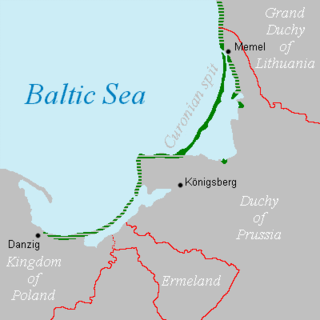Kursenieki language
| Kursenieki | |
|---|---|
| kursisk valuod | |
| Region | Curonian Spit (historically), Germany (nowadays) |
Native speakers | 2 full, 3 partial, a few passive speakers (2016)[1] |
| Language codes | |
| ISO 639-3 | – |
| Glottolog | curo1234 |
 The area of Kursenieki language speakers in 1649 | |
Kursenieki language (Kursenieki: kursisk valuod, German: Nehrungskurisch; Latvian: kursenieku valoda; Lithuanian: kuršininkų kalba) or Curonian language of the Curonian isthmus (German: kurische Sprache der Kurischen Nehrung[2]) is a dialect of the Latvian language spoken by the Kursenieki of the Curonian Spit, a thin strip of land stretching between southwestern Lithuania and the Kaliningrad exclave of Russia. In the process of various migrations of the 14th–17th centuries, Curonians (already speaking a Latvian dialect) settled along the Curonian Spit in East Prussia and became known as Kursenieki.
Influences and vocabulary
The Kursenieki language was influenced by
History

Before

Several pages of sample texts in Kursenieki language are included in the 1888 monograph Über die Sprache der preussischen Letten by Adalbert Bezzenberger and the 1927 monograph Kursenieku valoda by Juris Plāķis, where they describe the language spoken by the inhabitants of the Curonian Spit.[4]
There is a 2002 documentary film Tarp aštuonių vėjų ("Amidst Eight Winds") by Arvydas Barysas about the endangered Kursenieki language. The film, introducing the Curonian Spit, speaks about three brothers Sakutis (plural: Sakučiai) who had moved from the Spit to Sweden about 60 years ago, but still speak "kuršiškai".[5][6] In 2005 the film won the Best Overall Production Award at the second European Heritage Film Festival in Toblach (Italy) under the patronage of Europa Nostra.[7]
See also
References
- hdl:10125/24660.
- ISBN 978-99-849-8369-1.
- ISBN 3-922296-60-2
- ISBN 963-9116-42-4.
- ^ "Activity Report 2004, Lithuanian National Commission for UNESCO" (PDF). UNESCO. Retrieved June 24, 2019.
- ^ "Tarp 8 vėjų" the DVD annotation at an author's webpage (retrieved June 23, 2019)
- ^ "EUROPA NOSTRA Pan-European Federation for Heritage - NEWSLETTER Spring 2005". Retrieved June 24, 2019.
External links
